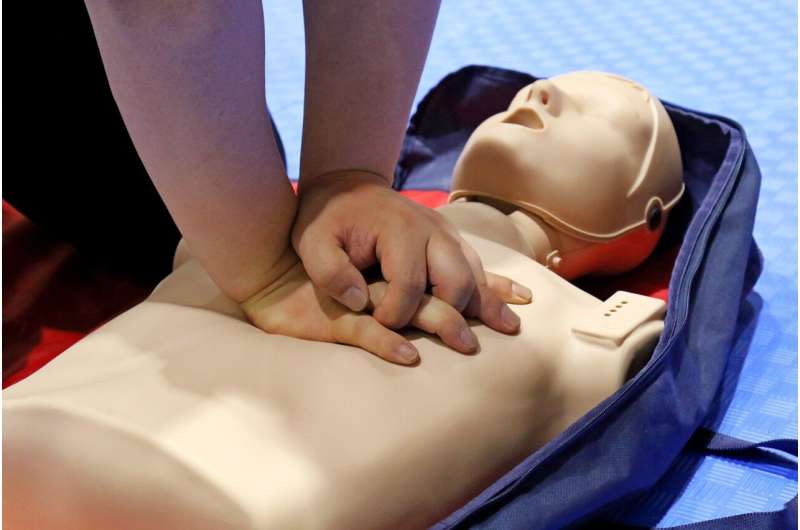This article has been reviewed according to Science X's editorial process and policies. Editors have highlighted the following attributes while ensuring the content's credibility:
fact-checked
trusted source
proofread
Black and Hispanic people in the US growing more confident learning and performing CPR

More Black and Hispanic people in the U.S. feel confident performing Cardiopulmonary Resuscitation (CPR). A 2023 American Heart Association survey found that 44% of Black Americans now feel confident in performing conventional CPR, up from 30% polled just three years ago. Hispanic survey participants also reported gains with a 7% increase from 37% in 2021 to 44%.
More than half of survey participants said they would perform either CPR or Hands-Only CPR and that their personal confidence level in performing CPR has improved from the 2021 survey
Immediate CPR and defibrillation are key to doubling the survival rate of cardiac arrest by 2030—an American Heart Association goal.
"We know Black and Hispanic people are less likely to receive help during a cardiac emergency due to lower rates of both bystander CPR and bystander AED use in these neighborhoods," American Heart Association volunteer expert Anezi Uzendu, M.D., interventional cardiologist at the University of Texas Southwestern and cardiac arrest survivor explains.
"The American Heart Association's efforts to provide people from all backgrounds and walks of life with the information to properly perform CPR is already increasing confidence in performing CPR among Black and Hispanic neighborhoods. However, we still have a lot of work to do to equip communities and save more lives."
According to the American Heart Association and the National Institutes of Health (NIH), a person experiencing cardiac arrest outside of a hospital has a 10% chance of surviving In less than half of these incidents there is a person willing and able to provide CPR, while waiting for emergency services to arrive.
That statistic drops more when the victim is a Black or Hispanic person due to the impact of race and socioeconomic status on the lay rescuer's performance of critical "chain of survival" actions, leading to differences in patient prognosis and survival. CPR, especially if performed immediately, could double or even triple a person's chance of survival.
The survey was conducted by Decision Analyst on behalf of the American Heart Association. The online study was conducted in 14 days, in December of 2023 among 1,268 nationally representative men and women aged 18 to 80 living in the U.S.
Other key findings include:
- Less than half of those surveyed are confident they can properly perform either conventional CPR or Hands Only CPR in an emergency.
- Nearly 1 out of 3 worry they will perform CPR incorrectly.
- About 1 in 5 are hesitant to perform either form of CPR for fear of unintentionally hurting the person.
- A quarter of those surveyed have never heard of Good Samaritan Laws, which exist to protect volunteers who provide aid to an injured person in an emergency.
The Association is working to change these statistics by empowering people to learn the life-saving skill of CPR.
"The Elevance Health Foundation has supported the Hands-Only CPR educational outreach for twelve years and remains committed to addressing health inequalities and strengthening our diverse communities," said Shantanu Agrawal, M.D., Chief Health Officer of Elevance Health. "Together with the American Heart Association, we are working to provide everyone with the proper resources and training to save a life of someone in need."
In October 2009, the American Heart Association launched its Hands-Only CPR initiative. These efforts have encouraged and taught people the two simple steps of Hands-Only CPR: when you see a teen or adult suddenly collapse, call 9-1-1 and press hard and fast in the center of the chest.
The Association has been tracking general awareness, attitudes and behavior related to adoption of Hands-Only CPR since 2009. Similar consumer surveys were conducted in 2021 and again in 2023. The surveys measure consumer awareness and perceptions of confidence in performing CPR, likelihood to perform CPR and reasons for hesitation in performing Hands-Only CPR.


















